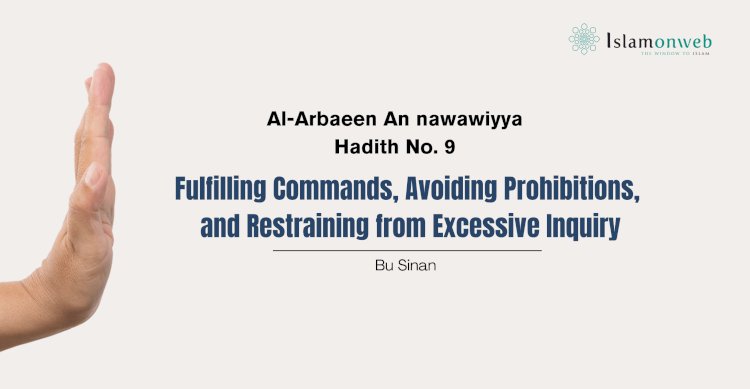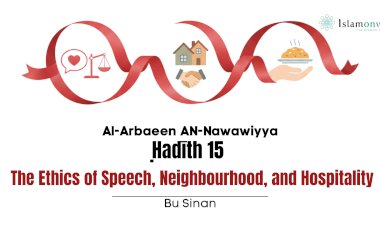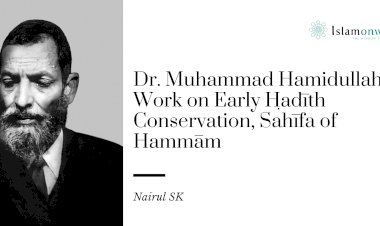Hadith No. 9 – Fulfilling Commands, Avoiding Prohibitions, and Restraining from Excessive Inquiry
عَنْ أَبِي هُرَيْرَةَ عَبْدِ الرَّحْمَنِ بْنِ صَخْرٍ رَضِيَ اللَّهُ عَنْهُ قَالَ: سَمِعْتُ رَسُولَ اللَّهِ صَلَّى اللَّهُ عَلَيْهِ وَسَلَّمَ يَقُولُ: "مَا نَهَيْتُكُمْ عَنْهُ. فَاجْتَنِبُوهُ, وَمَا أَمَرْتُكُمْ بِهِ فَافْعَلُوا مِنْهُ مَا اسْتَطَعْتُمْ؛ فَإِنَّمَا أَهْلِكَ الَّذِينَ مِنْ قَبْلِكُمْ كَثْرَةُ مَسَائِلِهِمْ, وَاخْتِلافُهُمْ عَلَى أَنْبِيَائِهِمْ" رَوَاهُ الْبُخَارِيُّ وَمُسْلِمٌ (
(٢) صحيح البخاري (٧٢٨٨)، وصحيح مسلم (١٣٣٧) في كتاب الفضائل، باب توقيره صلى اللَّه عليه وسلم.
On the authority of Abū Hurayrah ʿAbd al-Raḥmān ibn Ṣakhr (raḍiya Allāhu ʿanhu), who said:
"I heard the Messenger of Allah (ṣallallāhu ʿalayhi wa sallam) say:
'Whatever I have forbidden you, then avoid it completely. And whatever I have commanded you with, then do of it as much as you are able.
Verily, it was only the excessive questioning and differing with their prophets that destroyed those who came before you.'"
Narrated by al-Bukhārī (7288) and Muslim (1337).
Short Biography of Abū Hurayrah (raḍiya Allāhu ʿanhu)
Abū Hurayrah, whose real name is ʿAbd al-Raḥmān ibn Ṣakhr al-Dawsī al-Yamānī, was a noble companion of the Prophet ﷺ and the most prolific narrator of his ḥadīths. He hailed from the tribe of Daws in Yemen and was the first to embrace Islam from his people. He migrated to Madinah in the 7th year after Hijrah, during the expedition of Khaybar, and immediately joined the Prophet ﷺ there.
His kunyah, Abū Hurayrah (“Father of the Kitten”), came from his fondness for a small cat he used to carry in his sleeve. The Prophet ﷺ himself is reported to have addressed him with this title when he once saw him with a kitten.
Abū Hurayrah was known for his unwavering dedication to seeking knowledge. Unlike many other companions who were occupied with trade or farming, he devoted himself entirely to the companionship of the Prophet ﷺ, often enduring hardship and hunger to attend his gatherings. He was one of Aṣḥāb al-Ṣuffah, the poor companions who resided in the Prophet's mosque and were dedicated to learning.
He defended the large number of aḥādīth he narrated by explaining that while others were busy with worldly duties, he remained constantly at the Prophet’s side. The Prophet ﷺ once told him:
"Spread your garment."
Abū Hurayrah said:
"I spread it, and he gestured with his hands as if filling it, then said: 'Wrap it around you.' I did so, and I never forgot anything he told me after that."
(Agreed upon)
ʿUmar ibn al-Khaṭṭāb (raḍiya Allāhu ʿanhu) later appointed him as governor of Bahrayn, though Abū Hurayrah later declined to continue in office and chose to return to Madinah. During the caliphate of Muʿāwiyah, he served occasionally as a deputy for Marwān ibn al-Ḥakam.
Abū Hurayrah (raḍiya Allāhu ʿanhu) passed away in 59 AH, according to the strongest opinion, at the age of 78, and was buried in al-Baqīʿ in Madinah. Claims that his grave lies near ʿAsqalān are unfounded and refer to another companion.
He narrated a total of 5,374 ḥadīths, with al-Bukhārī and Muslim agreeing upon 325, Bukhārī alone narrating 93, and Muslim alone 190. Al-Bukhārī stated that over 800 companions and successors narrated from him, a testimony to his pivotal role in the preservation of the Sunnah[1].
Despite being the most prolific narrator of ḥadīth, some critics questioned how he narrated over 5,000 ḥadīths despite spending only about three years with the Prophet ﷺ.
However, scholars[2] clarified that:
- The number 5,374 includes repeated chains and wordings, and upon removing duplicates, his unique narrations number around 1,500–1,600, of which only about 110 are unique to him.
- Many of his narrations came through other companions, and a portion are not prophetic sayings, but descriptive or contextual (e.g., actions, approvals).
- The long lifespan of Abū Hurayrah after the Prophet ﷺ allowed him to transmit to the growing Muslim population, especially outside Madinah.
The stories used to attack his character are either weak or fabricated, often cited from late and unreliable sources. Modern ḥadīth analysis confirms that over 90% of his narrations are corroborated by other companions, proving his integrity and accuracy.
Thus, Abū Hurayrah (raḍiya Allāhu ʿanhu) stands vindicated as a trustworthy transmitter who played a crucial role in preserving the Sunnah for future generations.
Explanation of the First Part of the Ḥadīth
This noble ḥadīth holds immense significance as it lays down two foundational principles in the Sharīʿah: the obligation of avoiding prohibitions and the responsibility of fulfilling commands according to one’s ability. The Prophet ﷺ begins with the prohibition, indicating its greater weight and priority.
Obligation to Avoid What the Prophet ﷺ Has Forbidden
The Prophet’s words, “مَا نَهَيْتُكُمْ عَنْهُ فَاجْتَنِبُوهُ”, make clear that anything he forbade must be completely avoided. The use of the conditional particle "مَا" implies generality – all that falls under his prohibitions is to be avoided without exception, unless there is a clear evidence that the matter is only makrūh (discouraged), not ḥarām (prohibited).
Avoiding forbidden acts is often easier than fulfilling commands because it requires abstention, not action. Human nature is often tempted by prohibitions, so the command to avoid them is made absolute, without linking it to ability or conditions.
Unlike the next part of the ḥadīth, the Prophet ﷺ did not say “avoid what you can”. This shows the seriousness of forbidden acts.
Imām Aḥmad ibn Ḥanbal (may Allah have mercy on him) say : "The prohibition is more emphatic than the command. because no concession was given in any part of it, whereas the command is conditioned by one’s ability”. A similar sentiment is found in the saying of some early scholars: “Righteous deeds are performed by both the righteous and the wicked, but only the truthful (ṣiddīq) can truly abandon sin.”[3]
Prohibited actions are to be abandoned entirely unless one is compelled (e.g. eating dead meat under duress), which are rare exceptions governed by necessity.
Necessity permits the prohibited.
This exception is based on the Qur’anic verse:
"He has explained to you in detail what He has forbidden you, except under compulsion of necessity..." (Surah al-Anʿām 6:119)
Necessity (ḍarūrah) refers to cases where a person faces serious harm or threat to one of the five essential objectives of the Sharīʿah (al-maqāṣid al-khamsah):
- Preservation of religion
- Preservation of life
- Preservation of lineage
- Preservation of wealth
- Preservation of intellect
However, the permissibility of resorting to a forbidden act under necessity is governed by three strict conditions:
- No lawful alternative must be available
- The prohibited item must effectively relieve the necessity
- The use of the prohibited item must be limited strictly to what is necessary
Legal Principle: Prohibition is Heavier Than Command
Scholars have derived from this that prohibitions carry greater weight than commands, as illustrated in the fiqh maxim:
"درء المفاسد مقدم على جلب المصالح"
"Repelling harm takes precedence over acquiring benefit."[4]
This is because:
- Failing a command may be excused due to inability.
- But committing a prohibition entails active disobedience.
- Therefore, no concession is made in committing a forbidden act unless there is an actual necessity.
"...وَمَا أَمَرْتُكُمْ بِهِ فَافْعَلُوا مِنْهُ مَا اسْتَطَعْتُمْ"
“And whatever I have commanded you with, then do of it as much as you are able.”
Commands Are Bound by Capacity
This phrase establishes a fundamental principle of Islamic law: obligations are conditioned by one’s ability. The Prophet ﷺ emphasises that fulfilling his commands is required only to the extent of what one can bear, drawing directly from the Qur'anic basis:
- فَاتَّقُوا اللَّهَ مَا اسْتَطَعْتُمْ – “So fear Allah as much as you are able.” (al-Taghābun 64:16)
- لَا يُكَلِّفُ اللَّهُ نَفْسًا إِلَّا وُسْعَهَا – “Allah does not burden a soul beyond its capacity.” (al-Baqarah 2:286)
This reflects the mercy and ease built into the Sharīʿah. It removes hardship and allows room for adaptation in various circumstances such as illness, travel, or fear.
The Prophet ﷺ himself demonstrated this in practice:
- He said: “Pray standing; if you are unable, then sitting; and if you are unable, then lying on your side.” (al-Bukhārī)
- In travel, he shortened the prayer.
- When water was unavailable or harmful, he permitted tayammum.
- He allowed variations in the format of Salāt al-Khawf (Prayer in Fear) based on the situation in the battlefield.
Excessive Questioning and Disputing with Prophets – A Path to Destruction
The Prophet ﷺ concluded this ḥadīth with a stern warning, highlighting two key causes of destruction for previous nations:
- Excessive questioning, and
- Disputing with their prophets.
Islam, in contrast, is built on clarity, simplicity, and practicality. It differentiates between genuine inquiry for learning and excessive or speculative questioning that leads to:
- Complication of simple rulings.
- Opening doors to hardship.
- Imposing obligations not originally required.
The context of this hadith is explained in another long narration reported by Imam Muslim:
Abū Hurayrah (raḍiya Allāhu ʿanhu) said:
“The Messenger of Allah ﷺ addressed us and said:
‘O people! Allah has made ḥajj obligatory upon you, so perform ḥajj.’
A man asked: ‘Every year, O Messenger of Allah?’
The Prophet ﷺ remained silent. The man repeated the question three times, upon which the Messenger of Allah ﷺ said:
‘Had I said “yes,” it would have become obligatory—and you would not have been able to do it.’
Then he added:
‘Leave me so long as I leave you. Verily, those before you were only destroyed because of their excessive questioning and their disagreements with their prophets.
So when I command you to do something, do of it what you are able. And when I forbid you from something, then avoid it.’”
This message mirrors the story of Banū Isrā’īl, who were commanded to slaughter a cow. Instead of complying simply and immediately, they burdened themselves by repeatedly asking about its type, colour, and description:
"They said: Ask your Lord to clarify for us what it is... what colour it is..." (al-Baqarah 2:68–71)
Until finally, Allah said:
"They slaughtered it, but they almost did not."
Because of their reluctance, they ended up paying a high price; buying the only cow that matched all the imposed conditions for its weight in gold. They regretted their delay, but it was too late. The Prophet ﷺ feared for his Ummah to fall into the same pattern, so he warned:
“Those before you were destroyed due to their excessive questioning and disagreements with their prophets.”
Excessive Questioning Without Necessity Is Discouraged
Questioning without genuine need, especially when done with a spirit of challenge, not seeking guidance, is blameworthy. The Sunnah, as well as practice of the Salaf, discouraged speculative questions or those about matters that have not yet occurred.
The Prophet ﷺ said:
“Verily Allah has hated for you idle talk, excessive questioning, and wasting wealth.” (Ṣaḥīḥ al-Bukhārī)
Aḥmad narrated that the Prophet ﷺ prohibited al-ughloṭāt – difficult, twisted questions asked for show or confusion[5].
He also warned:“There will come people from my Ummah who will confound their scholars with convoluted questions. They are the worst of my Ummah.”[6]
Al-Ḥasan al-Baṣrī said: “The worst of Allah’s servants are those who chase after obscure questions and use them to confuse the people.”
The senior Companions, like Zayd ibn Thābit and Ubayy ibn Kaʿb, would not answer hypothetical questions. They would say:
“Has it happened?”
If the questioner said yes, they would respond. If no, they would reply: “Then leave it until it happens.”
ʿUmar ibn al-Khaṭṭāb even cursed one who asked about what had not yet occurred.
Analyzing different approaches on excessive questioning, Imam Ibn Ḥajar al-Haytamī explains[7] that people in matters of religious inquiry have fallen into two extremes. One group shut the door of questioning altogether, even in cases where inquiry was warranted and beneficial. As a result, they became carriers of fiqh without true understanding. They are from among the followers of the ḥadīth school according to him.
He carries on that on the opposite end, another group immersed themselves in speculative discussions and hypothetical scenarios, busying themselves with contrived questions and theoretical disputes. This led not only to division and confusion, but also to spiritual maladies such as arrogance, the pursuit of status, rivalry, and envy. Their engagement with knowledge was no longer for the sake of Allah, but rather for showing dominance and impressing the masses. This is from what the scholars have condemned, and what the Sunnah has indicated as blameworthy and forbidden, as previously mentioned.
Then al-Haytamī concludes that in contrast, the balanced path was embodied by the jurists of ḥadīth who act upon it, they directed their efforts toward understanding the meanings of the Qur’an and the Sunnah, the statements of the Companions and their successors, the rulings of ḥalāl and ḥarām, the foundations of the Sunnah, spirituality, heart-softening reminders, and the like, matters that purify the hearts and instil sincerity to the All-Knowing of the unseen.
May Allah make us among them by His grace and generosity.
References:
[1] [1] Ibn Ḥajar al-Haytamī, Al-Fatḥ al-Mubīn fī Sharḥ al-Arbaʿīn P. 272
[2] Adad Aḥādīth Abī Hurayrah – Taḥqīq wa-Istiqrāʾ” by Muḥammad ibn ʿAlī ibn Jamīl al-Maṭrī
[3] Ibn Ḥajar al-Haytamī, Al-Fatḥ al-Mubīn fī Sharḥ al-Arbaʿīn P. 275
[4] Ibn Ḥajar al-Haytamī, Al-Fatḥ al-Mubīn fī Sharḥ al-Arbaʿīn P. 274
[5] Musnad al-Imām Aḥmad, 5/435
[6] Reported by al-Ṭabarānī in al-Kabīr (2/98) and al-Khaṭīb al-Baghdādī in al-Faqīh wa’l-Mutafaqqih (no. 637), on the authority of Sayyidunā Thawbān (raḍiya Allāhu ʿanhu).
[7] Ibn Ḥajar al-Haytamī, Al-Fatḥ al-Mubīn fī Sharḥ al-Arbaʿīn P. 277
Disclaimer
The views expressed in this article are the author’s own and do not necessarily mirror Islamonweb’s editorial stance.
























Leave A Comment